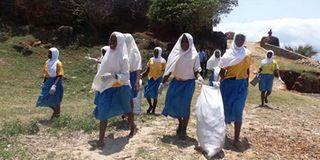Government urged to ban use of plastic to protect marine life

Primary School pupils take part in cleaning up the beach at Vinono Vyehu in Msambweni, Kwale County, on September 17, 2016. Research conducted by the Ocean Sole Foundation has revealed that uncontrolled plastic waste is choking sea life. PHOTO | FAROUK MWABEGE | NATION MEDIA GROUP
What you need to know:
- Ms Church said that the plastics not only affect marine habitats but also the beaches, hence chasing away tourists who find it hard to walk along dirty beaches.
- As a way of addressing the problem, her foundation has started a competition in search of solutions to reduce plastic and ensure its better use.
- Mr Mwabori disclosed that the rubbish which is found along the beach in Msambweni normally comes from as far as Zanzibar and Somalia.
- He said should the ocean continue being contaminated, even the coral rocks which form breeding grounds for fish will be affected.
Uncontrolled plastic waste is choking sea life and is threatening the marine ecosystem, research conducted by the Ocean Sole Foundation has revealed.
According to the survey, by 2050, there will be more plastic waste in the ocean than fish across the globe.
Speaking during the International Coastal Clean-Up Day at Vinono Vyehu in Msambweni Sub-County where 1,500 kilograms of rubbish was collected, Julie Church, the founder of the organisation, said the production of plastic materials has to stop.
She called on the Kenyan government to follow the example of Rwanda and Tanzania and impose a ban on the use of plastic bags and bottles in order to protect the marine ecosystem.
She added that as a way of addressing the problem, government institutions and private companies should go back to the using glass and abandon plastic.
“We have to reduce plastic use in the world. We need to find a substitute, otherwise our children will find more plastic in the sea than fish,” she said.

Julie Church, the founder of the Ocean Sole Foundation, shows objects made from recycled materials. She has called on the Kenyan government to impose a ban on the use of plastic bags and bottles in order to protect the marine ecosystem. PHOTO | FAROUK MWABEGE | NATION MEDIA GROUP
TOURISM AFFECTED
Ms Church said the plastic waste not only affect marine habitats but also the beaches, and hence chasing away tourists, who find it hard to walk along dirty beaches.
She added that once the plastic is consumed by fish, it also exposes people to the risk of cancer due to the chemicals found in plastic materials.
“We are living in what we call a plastic era but what we should understand is that we need a clean ocean and a clean ocean means healthy lives and healthy people,” she said.
To address the problem, Ms Church said her foundation is holding a competition to search for ways of reducing plastic and recycling the waste.
The winner of the will be awarded $10,000.
“We believe that waste has a value which is treatable and that is why between now and September 17, 2017 we are going to have a contest,” she said.
Hussein Mwabori, the founder of the Msambweni Turtle Group, said if the ocean continues to be contaminated, even the coral rocks on which fish breed would be affected.
Mr Mwabori disclosed that the rubbish found along the beach in Msambweni normally comes from as far away as Zanzibar and Somalia.
“The awareness about marine conservation is still very low among our people and that is why we are calling upon other organisations to come and help us,” he said.
The initiative was sponsored by Base Titanium, the Msambweni Turtle Group, Fly540, KCB, Posta Kenya, Kenya Wildlife Services, Watamu Marine Association, Diamond Trust Bank, SafariLink and Kuruwitu Conservation and Welfare Association.




